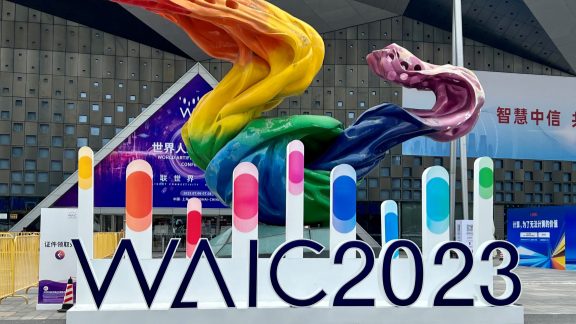TL;DR:
- China’s annual World Artificial Intelligence Conference (WAIC) is underway, emphasizing Beijing’s AI aspirations in the face of a deepening technological rivalry with the US.
- The conference, hosted by government ministries, features top Chinese AI firms and institutions, with a noticeable absence of major international players like Microsoft-backed OpenAI.
- Generative AI services such as ChatGPT and Google’s Bard are unlikely to enter the Chinese market due to regulatory concerns, leading to a closed ecosystem that favors local tech giants.
- The event has attracted over 400 enterprises, including 30 developers of large language models (LLMs) like ChatGPT.
- Strategic partners include Alibaba Group Holding, Ant Group, Tencent Holdings, Huawei Technologies, and SenseTime, while US-based Qualcomm stands out as the only American company sponsoring the event.
- Some US Big Tech firms will be present, but American companies remain cautious about sponsoring a Chinese AI conference amidst geopolitical tensions.
- The conference covers various topics, including LLMs, semiconductors, scientific intelligence, robotics, the metaverse, autonomous driving, and blockchain.
- Eight government departments are co-sponsors, reinforcing the significance of the event.
- Shanghai aims to become a central hub for China’s AI industry, with plans to attract tens of thousands of technology workers and hundreds of AI enterprises by 2025.
Main AI News:
China’s World Artificial Intelligence Conference (WAIC) commences this week, highlighting Beijing’s AI aspirations amidst an escalating technological rivalry with the United States. Hosted by various government ministries, this annual event draws China’s leading AI firms and institutions. However, the published agenda predominantly features local companies and speakers, noticeably excluding major international names. Surprisingly, Microsoft-backed OpenAI, the developer of ChatGPT, will not be in attendance.
Due to concerns raised by domestic regulators regarding generative AI, services like ChatGPT and Google’s Bard are unlikely to gain entry into the Chinese market. Consequently, AI becomes yet another closed garden within the confines of the Great Firewall, benefiting local tech giants. The Shanghai government reports that the conference has attracted over 400 enterprises, with at least 30 of them being developers of large language models (LLMs), the underlying technology behind products like ChatGPT.
Among the conference’s ten “strategic partners” or main sponsors, several Big Tech firms stand out. Alibaba Group Holding, along with its fintech affiliate Ant Group, and Tencent Holdings have secured their positions. Despite being sanctioned by the US, Huawei Technologies and SenseTime are also sponsoring the conference. It is worth noting that Alibaba owns the South China Morning Post.
The remaining partners on the list include Bank of Communications, investment firm Citic Group, state-owned telecom operators China Telecom and China Mobile, and Transwarp, a significant big-data infrastructure software developer. While not a strategic partner, US-based mobile chip design giant Qualcomm stands out as the sole American company sponsoring the event, among 22 “elite partners.” This marks a noticeable shift from the pre-pandemic period. In 2019, IBM, Microsoft, and Amazon Web Services held strategic partnerships, and Tesla CEO Elon Musk was one of the high-profile speakers.
Semiconductor companies have expressed concerns about Washington’s escalating restrictions on chip exports to China. However, American firms appear to be treading cautiously in this geopolitical minefield by exhibiting trepidation in sponsoring a Chinese AI conference.
Despite the reluctance to sponsor, several US Big Tech firms, including Apple, Amazon, Microsoft, and Tesla, will have a presence at the event. Delegates from these companies will engage in discussions covering topics such as LLMs, semiconductors, scientific intelligence, robotics, the metaverse, autonomous driving, and blockchain. Since 2018, the WAIC has been held annually in Shanghai, offering tech firms an opportunity to interact with Chinese officials. Five years ago, the inaugural event featured former vice-premier Liu He as the opening speaker.
Eight government departments are listed as co-sponsors, reinforcing the significance of the conference. These departments include the Shanghai Municipal People’s Government, National Development and Reform Commission, Ministry of Industry and Information Technology, Ministry of Science and Technology, State Cyberspace Administration of China, Chinese Academy of Sciences, Chinese Academy of Engineering, and China Association for Science and Technology.
In a renewed AI arms race sparked by the introduction of ChatGPT in November, Shanghai aims to position itself as the focal point for China’s industry goals through an ambitious plan to attract tens of thousands of technology workers. During the Global AI Developer Conference held in February, Shanghai officials reaffirmed their commitment to attracting 20,000 to 30,000 workers and 500 related AI enterprises by 2025.
Conclusion:
China’s World Artificial Intelligence Conference serves as a platform for showcasing the country’s AI ambitions, especially in the face of intensifying tech competition with the United States. The absence of major international players and the limited access to generative AI services like ChatGPT in the Chinese market creates an opportunity for local tech giants to flourish within the country’s closed ecosystem. The sponsorship landscape reflects a cautious approach from American firms, highlighting the complex geopolitical dynamics at play. As the conference covers diverse AI-related topics and draws support from both private and government sectors, it underscores China’s commitment to becoming a prominent player in the global AI market.

